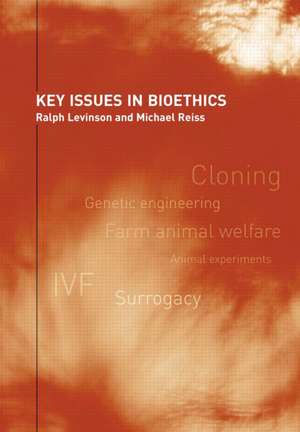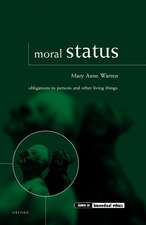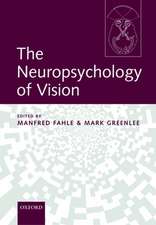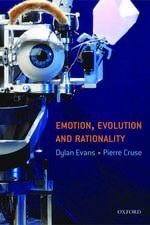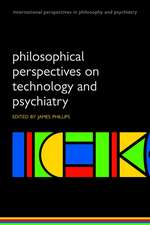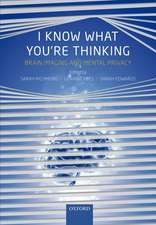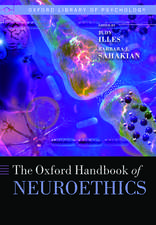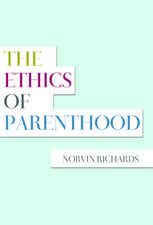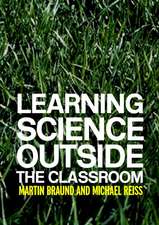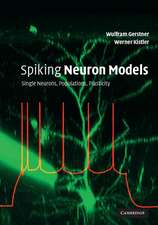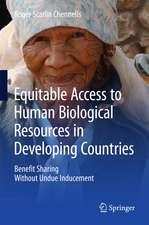Key Issues in Bioethics: A Guide for Teachers
Editat de Ralph Levinson, Michael Reissen Limba Engleză Paperback – 27 mar 2003
This book holds the answer. Written by leading ethicists, scientists and technologists, it offers a balanced and jargon-free guide to such highly debated topics as:
* cloning
* in vitro fertilisation
* genetic screening and genetic engineering
* farm animal welfare
* the use of animals in medical experiments.
Written specifically for the non-specialist teacher or lecturer, this book offers suggestions on how to approach the teaching of bioethics and provides useful sources of further information. It may also be of interest to undergraduates on science courses.
| Toate formatele și edițiile | Preț | Express |
|---|---|---|
| Paperback (1) | 438.99 lei 6-8 săpt. | |
| Taylor & Francis – 27 mar 2003 | 438.99 lei 6-8 săpt. | |
| Hardback (1) | 1053.57 lei 6-8 săpt. | |
| Taylor & Francis – 27 mar 2003 | 1053.57 lei 6-8 săpt. |
Preț: 438.99 lei
Nou
Puncte Express: 658
Preț estimativ în valută:
84.04€ • 86.48$ • 70.84£
84.04€ • 86.48$ • 70.84£
Carte tipărită la comandă
Livrare economică 01-15 martie
Preluare comenzi: 021 569.72.76
Specificații
ISBN-13: 9780415270687
ISBN-10: 0415270685
Pagini: 200
Ilustrații: 6 tables
Dimensiuni: 156 x 234 x 11 mm
Greutate: 0.37 kg
Ediția:1
Editura: Taylor & Francis
Colecția Routledge
Locul publicării:Oxford, United Kingdom
ISBN-10: 0415270685
Pagini: 200
Ilustrații: 6 tables
Dimensiuni: 156 x 234 x 11 mm
Greutate: 0.37 kg
Ediția:1
Editura: Taylor & Francis
Colecția Routledge
Locul publicării:Oxford, United Kingdom
Public țintă
Academic, Postgraduate, Professional, and Professional Practice & DevelopmentNotă biografică
Ralf Levison is a Lecturer in Science Education at the Institute of Education
Michael Reiss is Professor of Science Education and Head of the School of Mathematics, Science and Technology, Institute of Education
Michael Reiss is Professor of Science Education and Head of the School of Mathematics, Science and Technology, Institute of Education
Recenzii
'The book succeeds in its aim to allow teachers to be well informed about these complex issues and hence to be confident in running, guiding and supporting work with pupils and helping them to come to views that are well informed and founded on a sound knowledge base. This book is essential reading for all science teachers as the issues involved all feature, to varying degrees, in the curriculum at key stages 3 and 4.' - School Science Review
'This is an interesting and thought-provoking book which suggests to teachers how they may frame their discussions on bioethics with students and also provides essays on some of the most relevant issues currently faced by teachers.' - Journal of Biological Education
'This is an interesting and thought-provoking book which suggests to teachers how they may frame their discussions on bioethics with students and also provides essays on some of the most relevant issues currently faced by teachers.' - Journal of Biological Education
Cuprins
Part 1 Ethics and education; Chapter 1 Issues and scenarios, Ralph Levinson, Michael J. Reiss; Chapter 2 How we reach ethical conclusions, Michael J. Reiss; Chapter 3 TeachingCloning; Chapter 4 Interview between Professor Ian Wilmut and Ralph Levinson, Ian Wilmut; Chapter 5 Pursuing a rational analysis of cloning, Rebecca Bennett, John Harris; Chapter 6 Cloning? Yuk!, David King; Chapter 7 Clones and cloning, Sarah Franklin; Part 3 In vitro fertilisation; Chapter 8 In vitro fertilisation, Juliet Tizzard; Chapter 9 Surrogacy, Marilyn Strathern; Part 4 Genetic screening; Chapter 10 Genetic testing and screening, Jon Turney; Chapter 11 Genetic screening for sickle cell and thalassaemia, Elizabeth N. Anionwu; Part 5 Genetic engineering of people; Chapter 12 Curing what? Curing when? Curing how?, Bill Albert; Chapter 13 Should we genetically engineer humans?, Michael J. Reiss; Part 6 Farm animal well-being; Chapter 14 Breeding andFarm animal welfare, Joyce D'Silva; Part 7 Animals for medical experiments; Chapter 16 The case for the use of animals in medical experiments, Mark Matfield; Chapter 17 The case against the use of animals in medical experiments, Gill Langley;
Descriere
Young people are talking about complex ethical issues, such as GM foods, animal rights and cloning - bringing their views to bear in the classroom. The editors of this book set out to suggest how best teachers can become involved.
